


 44:43
44:43
What takes precedence, the rights of the individual or the safety of the community? Rabbi Herbert Bomzer tackles the question of whether compulsory medical treatment for tuberculosis is ethical from a Jewish perspective. This presentation took place in 1993 at the International Conference on Judaism and Contemporary Medicine. The video recording is courtesy of Dr
Rabbi Herbert Bomzer (2)
 44:56
44:56
What does Judaism say on the subject of medical malpractice? This presentation took place in 1993 at the International Conference on Judaism and Contemporary Medicine. The video recording is courtesy of Dr. Michael-Moshe Akerman M.D. who is the director of the conference.
Rabbi Herbert Bomzer (2)
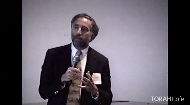 1:16:20
1:16:20
This presentation discusses complex medical issues. The views and opinions expressed here represent only those of the speaker and not that of Torah Café or the organizers of the conference. For the practical application of Torah views in individual cases please consult a Rabbi and Halachic authority who specializes in Jewish medical case law
Dr. Richard Grazi (1)
 52:53
52:53
Can the mind have multiple instances of consciousness? What’s the connection between Chabad Chassidism and the various parts of the brain? And do spiritual and scientific beliefs contradict each other? This is a vintage video and is being shared here for its historical value and its content, not for the quality of its video
Rabbi Dr. Yaakov Brawer (6)
 49:58
49:58
Jewish law forbids causing unnecessary pain to animals and mandates feeding them before oneself, yet permits experimenting on them. How do we understand this? And what is man’s status in relation to other forms of life on the planet? This presentation took place in 1993 at the International Conference on Judaism and Contemporary Medicine. The video recording is courtesy of Dr
Rabbi Sholom Ber Wineberg (5)
 1:07:55
1:07:55
What is the Halachic view of IVF and surrogate motherhood? Is one allowed to undergo such treatments? What is the status of such a child with regards to maternity (in the case of surrogate motherhood)? This presentation took place in 1993 at the International Conference on Judaism and Contemporary Medicine. The video recording is courtesy of Dr. Michael-Moshe Akerman M.D
Rabbi Zushe Winner (1)
 54:54
54:54
Over the past few decades the suicide rate has risen by staggering numbers and is the second or third biggest
Dr. Yisroel Suskind (2)
 46:39
46:39
What does Jewish law say about vegetarianism? This presentation took place in 1993 at the International Conference on Judaism and Contemporary Medicine. The video recording is courtesy of Dr. Michael-Moshe Akerman M.D. who is the director of the conference
Rabbi Alfred Cohen (1)
 14:52
14:52
Why were we commanded to give a half Shekel to the temple every year and not a whole one? Rabbi Shlomo Majeski will review a talk that the Lubavitcher Rebbe gave during the Shabbat that this session followed. This introductory talk was given in 1988 at the International Conference on Judaism and Contemporary Medicine. The video recording is courtesy of Dr
Rabbi Shloma Majeski (8)
 20:34
20:34
To see the talk that preceded this one which Rabbi Weinberg references, click here. This talk was given in 1988 at the International Conference on Judaism and Contemporary Medicine. The video recording is courtesy of Dr. Michael-Moshe Akerman M.D. who is the director of the conference.
Rabbi Yosef Weinberg (1)
 14:50
14:50
Rabbi Sholom Ber Wineberg offers a small glimpse into the life of the Rebbetzin Chaya Mushka Schneerson, of righteous memory. For the talk that followed this by Rabbi Wineberg's father on related topics, click here. This tribute was given in 1988 at the International Conference on Judaism and Contemporary Medicine. The video recording is courtesy of Dr. Michael-Moshe Akerman M
Rabbi Sholom Ber Wineberg (5)
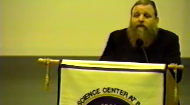 35:29
35:29
What makes life worth living? Is it youth, wealth, family, health, or one's job? Actually it's none of these. The inability to define somethings of value isn’t because its value is lacking, but rather because its value is inherent and beyond definition. This presentation took place in 1993 at the International Conference on Judaism and Contemporary Medicine
Rabbi Sholom Ber Wineberg (5)
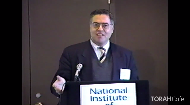 52:32
52:32
What are the practiced guidlines for doctors to abide by, and where do they come from? This presentation took place in 1997 at the International Conference on Judaism and Contemporary Medicine. The video recording is courtesy of Dr. Michael-Moshe Akerman M.D. who is the director of the conference. This presentation discusses complex medical issues
Dr. Lawrence Resnick (1)
 1:14:25
1:14:25
What is the Jewish perspective of the "Healthy Mind, Healthy Body" connection? Are they at odds with each other, or are they interconnrected? This presentation took place in 1988 at the International Conference on Judaism and Contemporary Medicine. The video recording is courtesy of Dr. Michael-Moshe Akerman M.D. who is the director of the conference.
Rabbi Dr. J. Immanuel Schochet (34)
 1:23:22
1:23:22
It is stated that everything in the world can be found in the Torah. Is this something that requires faith, or can we literally see how that’s the case? This presentation took place at the International Conference on Judaism and Contemporary Medicine. The video recording is courtesy of Dr. Michael-Moshe Akerman M.D. who is the director of the conference.
Rabbi Eliezer Touber (1)
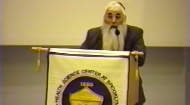 44:59
44:59
This is a vintage video and is being shared here for its historical value and its content, not for the quality of its video. This presentation took place in 1993 at the International Conference on Judaism and Contemporary Medicine. The video recording is courtesy of Dr. Michael-Moshe Akerman M.D. who is the director of the conference
Dr. Yisroel Suskind (2)
 45:54
45:54
Why were animals created before humans, and why are we obligated to feed them before ourselves? And are we better than them? This is a vintage video and is being shared here for its historical value and its content, not for the quality of its video. This presentation took place in 1993 at the International Conference on Judaism and Contemporary Medicine
Rabbi Sholom Ber Wineberg (5)
 1:34:29
1:34:29
Rabbi Zelig Sharfstein will discuss some contemporary medical questions that have arisen what Jewish Law has to say about them. This is a vintage video and is being shared here for its historical value and its content, not for the quality of its video. This presentation took place in 1988 at the International Conference on Judaism and Contemporary Medicine
Rabbi Zelig Sharfstein (1)
 35:26
35:26
This is a vintage video and is being shared here for its historical value and its content, not for the quality of its video. This presentation took place in 1999 at the International Conference on Judaism and Contemporary Medicine. The video recording is courtesy of Dr. Michael-Moshe Akerman M.D. who is the director of the conference.
Professor Avraham Steinberg (7)
 1:22:09
1:22:09
Dr. Michael Akerman will explain what it means that "the work of man is greater than the work of God", and how God made a world that mankind is supposed to improve upon, such as making food and clothes from natural and raw material. The same applies to science and medicine
Dr. Alfred Sofer (2)
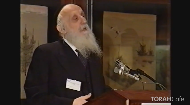 1:19:31
1:19:31
Rabbi Dr. Twerski will discuss the personal touch that the relationship between a doctor and their patient had years ago versus how it is today. He will also discuss what medical information one may discloss for the purposes of Shiduchim. This is a vintage video and is being shared here for its historical value and its content, not for the quality of its video
Rabbi Dr. Abraham J. Twerski (16)
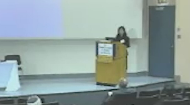 1:05:48
1:05:48
When IVF is used to create a pregnancy, who is the real mother? How do we ensure that the donated sperm doesn’t get mixed up with someone else’s? And is donating sperm always permitted, or does it violate the prohibition of “Motzei Zera L’Vatalah”? This is a vintage video and is being shared here for its historical value and its content, not for the quality of its video
Dr. Susan Lobel (2)
 1:07:39
1:07:39
Can mandatory vaccination be objected to? Who gets a vaccine first if there isn’t enough for everyone? And can a vaccine be used if a tiny fraction of recipients will die from it? This is a vintage video and is being shared here for its historical value and its content, not for the quality of its video
Dr. Aaron Bennett (1)
 52:14
52:14
This is a vintage video and is being shared here for its historical value and its content, not for the quality of its video. This presentation took place in 1999 at the International Conference on Judaism and Contemporary Medicine. The video recording is courtesy of Dr. Michael-Moshe Akerman M.D. who is the director of the conference
Dr. John C. LaRosa (1)
 1:13:52
1:13:52
Is euthinasia permitted in any circumstances? This is a vintage video and is being shared here for its historical value and its content, not for the quality of its video. This presentation took place in 1992 at the International Conference on Judaism and Contemporary Medicine. The video recording is courtesy of Dr. Michael-Moshe Akerman M.D
Rabbi Dr. Abraham S. Abraham (1)
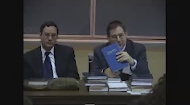 20:11
20:11
This is a vintage video and is being shared here for its historical value and its content, not for the quality of its video. This presentation took place in 2002 at the International Conference on Judaism and Contemporary Medicine. The video recording is courtesy of Dr. Michael-Moshe Akerman M.D. who is the director of the conference.
Rabbi Dr. Edward Reichman (51)
 1:18:19
1:18:19
What is a doctor’s obligation for a patient who is dying? What procedure may or may not be administered? Does a patient who’s brain dead require medical care? Also, discover the benefits of appointing a healthcare proxy, and join Dr. Powderly in her experience as a member of multiple Ethics Committees
Dr. Kathleen E. Powderly (3)
 1:34:12
1:34:12
How does Jewish law look at embryonic stem cell research? This is a vintage video and is being shared here for its historical value and its content, not for the quality of its video. This presentation took place in 2002 at the International Conference on Judaism and Contemporary Medicine. The video recording is courtesy of Dr. Michael-Moshe Akerman M.D
Dr. Miriam H. Feuerman (2)
 1:24:32
1:24:32
Should every effort be made to save a baby even if it will have neurological and cognitive defects, and a poor quality of life? Is abortion ever permitted? Are we ever allowed to take someone off life support? This is a vintage video and is being shared here for its historical value and its content, not for the quality of its video
Dr. Kathleen E. Powderly (3)
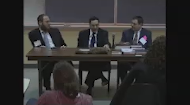 37:13
37:13
Listen to some of the challenges Jewish medical students faced while doing their residency at various hospitals (like Shabbat and Kosher), and how they overcame them. This is a vintage video and is being shared here for its historical value and its content, not for the quality of its video
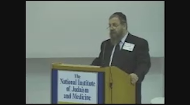 1:06:05
1:06:05
Is human genome editing ethical? How do we deal with the ubiquities paradoxes in life and religion? And, can we effect celestial events that determine our fate? This is a vintage video and is being shared here for its historical value and its content, not for the quality of its video
Professor Robert Pollack (1)
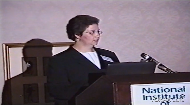 1:13:05
1:13:05
What are the ethical problems with human cloning? Is a cloned person unique or just a copy of someone else? Is it even considered a human being? May we use cloning to enhance a person’s physical capabilities? Are we “playing God” by doing gene therapy? This is a vintage video and is being shared here for its historical value and its content, not for the quality of its video
Dr. Miriam H. Feuerman (2)
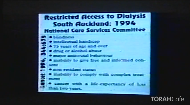 55:26
55:26
Is it fair for the rich to have the most access to organ transplants? What if a treatment is too expensive, not covered by insureances, or dictated to be done a certain way by the insurance? Should a CEO make a higher salery if his medical insurance isn't making money? And is the dialisys machine allowed to be removed under any circumstances? This is a vintage video and is being shared here for its historical value and its content, not for the quality of its video
Dr. Eli Friedman (2)
 1:11:00
1:11:00
The Ethical Aftermath of Sep 11: Body Issues, remarriage, Inheritance. In th aftermath of 9/11, many Halachic complications and dillemas arose, from how to properly deal with the remainig body parts and bones, to wives that don't know the fate of their husbands who were in the Twin Towers at the time, but haven't been seen or confirmed dead by a witness
Dr. Charles Cantonese (1)
 1:04:02
1:04:02
Should one undergo genetic testing to detect if they have a cancer gene? Perhaps it’s better not to know since not much can be done? This is a big ethical dilemma with reasons on both sides of the argument. This is a vintage video and is being shared here for its historical value and its content, not for the quality of its video
Dr. Harvey Stern (1)
 46:22
46:22
What are the ramifications of having many people who are uninsured, and what are solutions for that? This is a vintage video and is being shared here for its historical value and its content, not for the quality of its video. This presentation took place in 1999 at the International Conference on Judaism and Contemporary Medicine. The video recording is courtesy of Dr
Dr. Benjamin Safirstein (1)
 1:07:40
1:07:40
Proffesor Avraham Steinberg gives answers to various questions from medical students, from violating the Shabbat for the sake of one's life, to paitient confidentiality issues, and more. This is a vintage video and is being shared here for its historical value and its content, not for the quality of its video
Professor Avraham Steinberg (7)
 1:11:47
1:11:47
Dirty bombs are quite scary. But with the citizens properly informed, we can - in certain ways - take the "terror" out of chemical terrorism. In this video, we primarily take a look at the ethical and moral issues surrounding triage, and how we generally reconcile them according to Jewish law
Dr. Angelo Aquista (1)
 1:04:34
1:04:34
There are three basic reasons for gender selection when conducting In Vitro Fertilization. In this video, we analyze the different methodologies involved. The Halachic and ethical ramifications of IVF and gender selection - as well as the definition of the Torah commandment to "Be fruitful and multiply" - are addressed, citing sources from the Talmud and Jewish law
Dr. Adena K. Berkowitz (1)
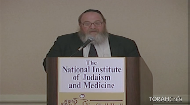 1:15:53
1:15:53
Is the current system of malpractice lawsuits fair? Does it even help patients? Are there reforms or laws that can be introduced to reduce the cost of being sued? This is a vintage video and is being shared here for its historical value and its content, not for the quality of its video
Assemblyman Richard N. Gottfried (1)
 44:46
44:46
Are we obligated to provide organ transplants for people who don't have that much longer to live? Is taking an organ from a child allowed? And should there be a market for organs? This is a vintage video and is being shared here for its historical value and its content, not for the quality of its video
Dr. Amy L. Friedman (1)
 1:11:37
1:11:37
This is a vintage video and is being shared here for its historical value and its content, not for the quality of its video. This presentation took place at the International Conference on Judaism and Contemporary Medicine on May 15th 2005, at the Hilton Hotel in New York City. The video recording is courtesy of Dr. Michael-Moshe Akerman M.D
Dr. Velvl Greene (2)
 1:29:48
1:29:48
Can someone who is suffering be taken off life support under any circumstances? This is a vintage video and is being shared here for its historical value and its content, not for the quality of its video. This presentation took place at the International Conference on Judaism and Contemporary Medicine on May 15th 2005, at the Hilton Hotel in New York City
Dr. Kathleen E. Powderly (3)
 1:38:31
1:38:31
Does a crisis destroy one’s life, or can it ultimately prove to have been a blessing in disguise and reveal things about a person that would have otherwise never been discovered? What are our religious obligations in trying to help ourselves medically; must it be within the natural order of the world or can we rely strictly on divine intervention? And is prayer about changing G-d's mind, or about changing ourselves and our perspective? This is a vintage video and is being shared here for its historical value and content, not for the quality of its video
Dr. Bernie S. Siegel (1)
 1:16:25
1:16:25
Can healthy lifestyle choices be mandated on individuals who engage in unhealthy habits? Can someone be stopped from doing something that will create a burden on the community? Are we free to do with our bodies as we see fit even if it will be harmed by our behaviors? And does Judaism have anything to say about one’s obligation towards the wellbeing and maintenance of his body? This is a vintage video and is being shared here for its historical value and its content, not for the quality of its video
Dr. Alfred Sofer (2)
 1:20:00
1:20:00
Are doctors required to treat patients who can’t afford to pay for the care? What obligations does the society have towards caring for it’s sick and needy? And what is the Jewish approach and view to this? This is a vintage video and is being shared here for its historical value and its content, not for the quality of its video
Dr. Robert Jacobs (1)
 1:21:33
1:21:33
Marriage is a holy union and procreation is one of the most important acts one can do as it is the foundation upon which civilization stands. As such, extreme care must be taken that one’s relationship and marital life is in total accordance with the law and the spirit of the Torah
Rabbi Avrohom Blumenkrantz (1)